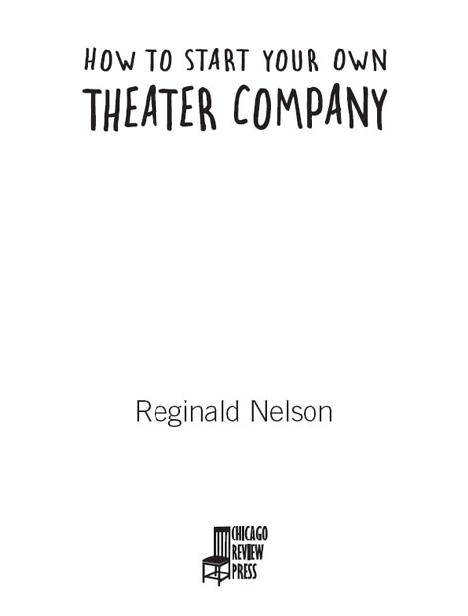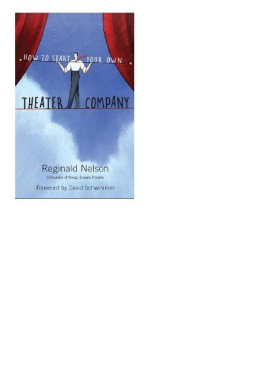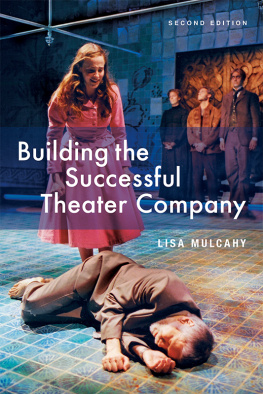Reginald Nelson - How to Start Your Own Theater Company
Here you can read online Reginald Nelson - How to Start Your Own Theater Company full text of the book (entire story) in english for free. Download pdf and epub, get meaning, cover and reviews about this ebook. year: 2010, publisher: Chicago Review Press, genre: Art. Description of the work, (preface) as well as reviews are available. Best literature library LitArk.com created for fans of good reading and offers a wide selection of genres:
Romance novel
Science fiction
Adventure
Detective
Science
History
Home and family
Prose
Art
Politics
Computer
Non-fiction
Religion
Business
Children
Humor
Choose a favorite category and find really read worthwhile books. Enjoy immersion in the world of imagination, feel the emotions of the characters or learn something new for yourself, make an fascinating discovery.
- Book:How to Start Your Own Theater Company
- Author:
- Publisher:Chicago Review Press
- Genre:
- Year:2010
- Rating:4 / 5
- Favourites:Add to favourites
- Your mark:
- 80
- 1
- 2
- 3
- 4
- 5
How to Start Your Own Theater Company: summary, description and annotation
We offer to read an annotation, description, summary or preface (depends on what the author of the book "How to Start Your Own Theater Company" wrote himself). If you haven't found the necessary information about the book — write in the comments, we will try to find it.
How to Start Your Own Theater Company — read online for free the complete book (whole text) full work
Below is the text of the book, divided by pages. System saving the place of the last page read, allows you to conveniently read the book "How to Start Your Own Theater Company" online for free, without having to search again every time where you left off. Put a bookmark, and you can go to the page where you finished reading at any time.
Font size:
Interval:
Bookmark:


Library of Congress Cataloging-in-Publication Data
Nelson, Reginald.
How to start your own theater company / Reginald Nelson.
p. cm.
Includes index.
ISBN 978-1-55652-813-2
1. Theater managementUnited States. 2. TheaterProduction and directionUnited States. 3. Congo Square Theatre Company (Chicago, IL)
I. Title.
PN2291.N45 2010
792.023dc22 2009042271
Cover design: TG Design
Cover artwork: Antoine Savolainen, Images.com/Corbis
Interior design: Pamela Jurez
2010 by Reginald Nelson
Al rights reserved
Published by Chicago Review Press, Incorporated
814 North Franklin Street
Chicago, Ilinois 60610
ISBN 978-1-55652-813-2
Printed in the United States of America
5 4 3 2 1
For Mama
I can take any empty space and cal it a bare stage. A man walks across this empty space whilst someone else is watching him, and
this is al that is needed for an act of theatre to be engaged.
Peter Brook
CONTENTS
FOREWORD
I n 1988, upon graduating from Northwestern University, seven other former students and I started the Lookingglass Theatre Company in
Chicago. We had acted with and directed one another while at school and had come to share a common process and an aesthetic that we loved.
We wished to continue to develop this vision, longed to be able to support ourselves through our work, hoped to be celebrated, dreamed of
having our own theater, and were determined to be the Next Big Thing. We pooled our life savings, begged and borrowed, and began what was
to be the greatest chalenge of our artistic and professional lives: launching (and, more important, sustaining) a not-for-profit ensemble theater
company in arguably the most competitive city in the country.
In 2009 Lookingglass celebrated its 20th season, and its stil going strong. Weve created more than 50 original plays, al world premieres; toured
productions across the country; expanded our ensemble to more than 20 actors, writers, directors, and designers; and maintained a stable of
diverse artistic associates. Weve built a permanent home, a completely flexible, state-of-the-art black box theater in a historic building on
Michigan Avenue; grown our annual operating budget to more than $3 milion; cultivated a dedicated staff, a generous and passionate board of
directors, and an army of interns; and launched an outreach and education program that currently reaches and teaches 15,000 students a year.
I am proud of what we, as a company, have accomplishedbut I must confess that it was against unbelievable odds. The stories of financial crisis,
loss of faith, bitter disagreements, devastating reviews, horrific audience attendance, emergency room visits, and brink-of-disaster saves are too
numerous to detail. I cant tel you how many wonderful companies with untold potential we admired over the yearsthen watched as they
suddenly imploded or slowly dissolved, forced to fold, never to be heard from again. If only they (and we!) had had Reginald Nelsons terrific
guide to start off on the right foot.
This excelent how-to is a necessity for anyone out there crazy and brave enough to start a theater company. Its an essential, practical, candid,
inspiring, informative, and thoroughly entertaining manual.
I had the privilege of directing Reg in our companys production of Studs Terkels book Race: How Blacks and Whites Think and Feel About
the American Obsession, and let me just say hes one of the finest actors Ive ever known. Whats fantastic about Reg (and you can feel it in his
writing) is his confidence, tenacity, passion, generosity, talent, and inteligenceeach of which is absolutely essential to the success of a theater
company. If you possess these same attributes, then this bookand a little luckare al you need.
D AVID S CHWIMMER
INTRODUCTION
W hy open a theater company? Simple: so you can work. Every year, thousands of young people receive bachelor of arts or bachelor of fine
arts degrees in acting from more than 200 American coleges and universities. Theres even been an increase in young actors moving on to receive
their master of fine arts degrees from graduate theater programs as wel. I have a BFA from Howard University in Washington, D.C., and an MFA
from the University of Ilinois at Urbana-Champaign. By the time an actor leaves a program and attempts to gain employment at an established
theater, he or she has to wait behind a long list of alumni of that particular theater and pray that he or she serves the companys casting needs.
Trust me, nothings worse than salivating year after year over the hope that, at some point in its season, the Public, Guthrie, Goodman, Old Globe,
or Steppenwolf produces a play that you might be right for. If steady, inspiring work is what youre looking for, your best bet is to round up a
posse of peers and do work that speaks to you (and, more important, to an audience). For those of you who want to live your dream of being on
the stage, opening your own company is the way to go.
Thats exactly what I and a group of friends from undergraduate and graduate school did when we launched Congo Square Theatre Company in
the great city of Chicago in the fal of 2000. I was fortunate enough to have attended school with some very talented people, and it seemed natural
for al of us to continue working together. The best thing a young artist can do is create his or her own aesthetic, and established organizations have
little patience for green actors who are stil trying to find themselves. Major theaters spend big money on their productions, and they have a very
limited margin of error to waste on an inexperienced actor. If youre going to fal on your face in the beginning of your career, its best to do it in
front of 60 seats instead of 600.
I wrote this book to give you a shot at living your dream of becoming a professional performer. As the founding board president and former
managing director of Congo Square, I know firsthand what it takes to lift a theater company off the ground. The book is a business plan for actors
by an actor; its intended to give you the play-by-play on how to attack your theater endeavor with vision, integrity, and passion. In these pages
youl find advice on which jobs offer the most flexibility and how to set up a corporation, develop a board of directors, and choose a mission
statement. Finaly, youl learn what its like to manage an organization as I take you through the highs and lows of the first three seasons of Congo
Square, including a high-profile colaboration with the renowned Steppenwolf Theatre Company.
In the five years I was there running the company, we went from a $15,000-a-year organization to a $200,000-a-year operationcomplete with
two ful-time staff members, two part-time assistants, and a large, permanent, fuly equipped office. From the outset, those were my goals as a
founder: to raise enough funds to sustain the theater, to provide paid positions, and to create community awareness of the company in a short
period of time so I would no longer have to work as an administrator but could focus solely on acting instead. In other words, my goal was to
establish a stable, professional company and work within it.
The most common reasons that new theater companies fold are a lack of serious artistic focus and fiscal mismanagement. This book discusses
Next pageFont size:
Interval:
Bookmark:
Similar books «How to Start Your Own Theater Company»
Look at similar books to How to Start Your Own Theater Company. We have selected literature similar in name and meaning in the hope of providing readers with more options to find new, interesting, not yet read works.
Discussion, reviews of the book How to Start Your Own Theater Company and just readers' own opinions. Leave your comments, write what you think about the work, its meaning or the main characters. Specify what exactly you liked and what you didn't like, and why you think so.













